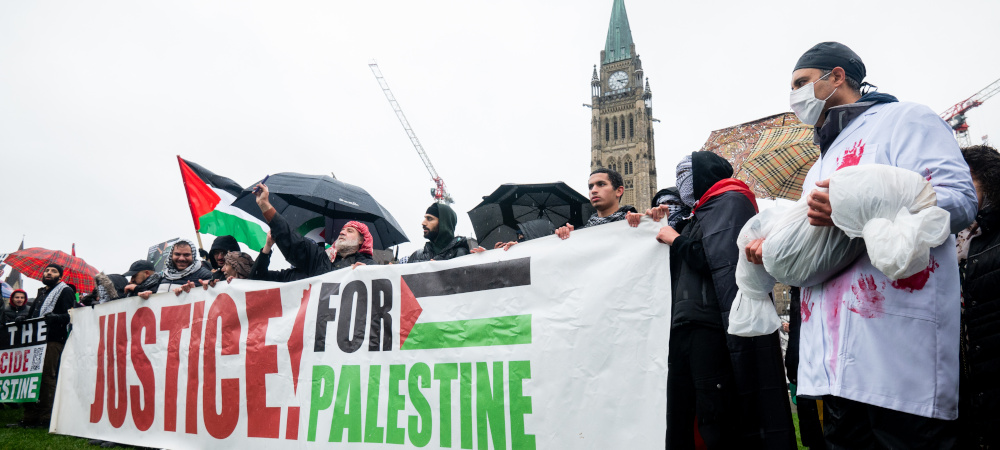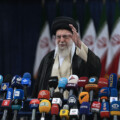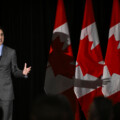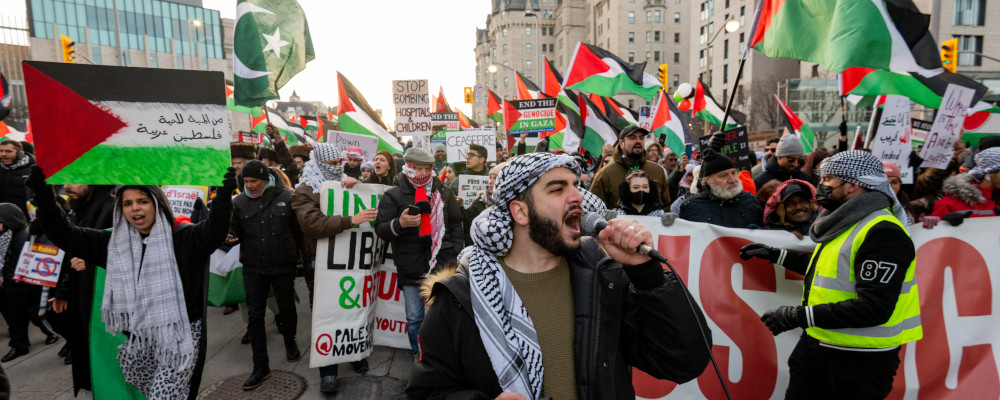At a scrum on Monday morning, Deputy Prime Minister Chrystia Freeland was asked about the protests on Parliament Hill over the weekend where pro-Palestine protestors chanted “Long live October 7” and “October 7 is proof that we are almost free.” As Jews were preparing to celebrate our liberation from slavery at the Seder table, and with over 130 hostages snatched by Hamas still unaccounted for, Freeland could not muster a clear condemnation of those who would celebrate their murder, torture, rape, and kidnapping. “I wasn’t in Ottawa over the weekend,” she demurred.
A few hours later, after gathering her talking points, Freeland issued a statement expressing “shock and disgust” at the protests. But the fact that she needed time to consult with her comms staff before doing so is evocative of a much bigger problem. Imagine a crowd cheering in approval of the lynchings of Black people. Can there be any doubt that Freeland wouldn’t have found herself similarly muzzled in her response?
As protestors were jubilantly celebrating the October 7 pogroms as proof of their imminent freedom in Ottawa, campuses in the United States have been similarly roiled with increasingly tense pro-Palestine encampments. The campus groups are nominally asking for amnesty for students who had been suspended for earlier protests, divestment from certain Israel bonds, and disclosure of how the university invests its billions in endowments.

Some of the happenings at the Yale and Columbia encampments seemed like standard university tactics. There were exhortations to bring toothpaste, dance shows, and zine workshops. There were Shabbat services led by anti-Zionist Jewish student groups and Muslim prayers. I have to admit, as someone who hasn’t studied on a university campus for over a decade, I have a wistfulness for both youthful idealism and the meaning-making impulse to join up with a cause bigger than one’s self.
But erstwhile defenders of the youth simply expressing noble, if somewhat naive, pacificism, are missing the clear lust for violence on display at these protests. As much as I support free expression, the level of support for terrorist tactics like October 7 at these protests is a threat to liberal democracies that cannot be dismissed as mere peaceful protests by naïve youth.
There were cut-and-dry legal wrongs being committed: assault, including where Jewish students and faculty who merely committed the sin of being visibly Jewish were encircled with human chains and physically blocked. There was a young masked blonde woman who carried a sign menacing a group of pro-Israel counter-protestors as “AL-QASM’s NEXT TARGETS,” referring to the armed wing of Hamas that led the October 7th attacks and arguably a direct incitement to violence and clear grounds for expulsion under Columbia’s code of conduct. A Jewish woman, Sahar Tartak, was poked in the eye with a Palestinian flag and had to go to hospital.
But the most loathsome aspect of the weekend’s horror shows on both sides of the border was the unanimity with which pro-war, pro-eradication of Jewish and Israeli life, and pro-terror slogans were embraced by the crowds. The whole crowd joined in on chants of “Go back to Poland,” and “Burn Tel Aviv to the ground.”
Two weeks ago in downtown Toronto, a “ceasefire now” pro-Palestine protest let its mask slip when, upon hearing a loudspeaker announcement that the Islamic Republic of Iran had sent 300 drones and missiles to Israel, virtually all those present, including children, hooted and cheered in delight.
And, of course, in Ottawa, practically the whole crowd went along with gleeful chants in support of October 7.
These protestors are not for peace, they are for violence— seemingly even beyond the borders of Israel and Palestine. When they say death to America and death to Israel, I believe they mean it.
This truth which is apparent to anybody with eyes and 30 seconds to watch a social media clip is frequently being downplayed as a few bad apples. Special Representative on Combatting Islamophobia Amira Elghawaby tweeted that the “problematic speech” of a “few individual protesters” is unacceptable and contrary to our shared values but then added she was concerned about “deliberate efforts to smear all protesters with one brush. It’s difficult to square Elghawaby’s assertion that it was only a “few individual protestors” when clearly the hateful chants were coming from the whole crowd on Parliament Hill.

Moreover, the pro-Palestine movement has repeatedly failed to purge itself from its continually prominent hateful elements. Not every Columbia student might have been onside with marking Jewish students as the Hamas Al-Qassam Brigade’s next targets, but there has been no public disavowal of this conduct, nor of violence against Jews and Israelis generally. As Bret Stephens noted in the New York Times a few weeks ago, “The mark of a morally serious movement lies in its determination to weed out its worst members and stamp out its worst ideas. What we’ve too often seen from the ‘Free Palestine’ crowd is precisely the opposite.”
This is no accident. It follows from the ideological foundations of the movement which are plain for anyone to see. The main student organization behind the campus protests, Students for Justice in Palestine, issued this statement after October 7th:
Today, we witness a historic win for the Palestinian resistance: across land, air, and sea, our people have broken down the artificial barriers of the Zionist entity, taking with it the facade of an impenetrable settler colony and reminding each of us that total return and liberation to Palestine is near.
In the settler-colonialism ideology, which was spoon-fed to the students at the same elite institutions now scrambling to contain its fruits, any critical assessment of the colonized’s means of resistance—apparently, up to and including rape and torture, and slaughter of innocents—is an unacceptable imposition of white colonizer standards.
Alarmingly, this ideological framework also extends to rejecting the basic premises of a free society governed by laws. Yesterday, Students for Justice in Palestine tweeted out “WE REFUSE TO BE SUBSUMED INTO A LIBERAL FIRST AMENDMENT FRAMEWORK!”
What they mean is that they don’t want to be accommodated within a liberal society, they want to burn it to the ground. We’d best listen and act accordingly.
Recommended for You

The Notebook by Theo Argitis: Mark Carney’s first major tests

Michael Bonner: Are we witnessing the last gasp of Iran’s Islamic Republic?

Need to Know: Yahoo, Alberta! You’re doing something right

Peter Menzies: Justin Trudeau’s legislative legacy is still haunting the Liberals




